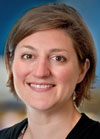Ordering the wrong test, misinterpreting a test result, and failing to retrieve a lab result are the three most common problems in laboratory services that lead to malpractice claims (1, 2). To help physicians order the right test, clinical laboratories have created a variety of strategies focused on test utilization.
One widely used strategy is providing physicians the opportunity to consult with an expert regarding appropriate testing options. This approach has become particularly important in genetic testing, because it is difficult for physicians to remain knowledgeable about the ever-expanding list of new tests. In fact, it is becoming more common for large laboratories to have genetic counselors on staff to help physicians, especially those not versed in genetics, order the appropriate genetic test for their patients.
Unfortunately, physicians are sometimes uncomfortable with genetic testing consults as they may feel asking for help shows a lack of competence on their part. To overcome such obstacles, consultants need to gain the trust of the ordering physician.
Organize and Prepare
In our experience as genetic counselors, two important elements of successful consultations with physicians are organizing the facts of the case and preparing for the interaction. Reviewing the facts of the case before talking to the physician involves taking a couple of minutes to read the provider's recent clinic notes and the patient's relevant studies, both completed and pending.
Once the facts are organized, the second task is preparing a list of what you want to achieve during the consult. One frequently-neglected, but essential, aspect of preparing is having a plan that avoids recollecting a specimen. Alternatively, when specimen recollection is necessary, making it easy to do so improves the chances that the physician will agree to the recommended order change.

Physician response to the unprepared test utilization consultant.
A Case Study
The following sample dialogs illustrate the difference between a genetic test utilization consultant who is prepared and one who is unprepared. In the case being discussed, changing the test order would provide the physician with the information needed to make a diagnosis and avoid additional testing.
The Prepared Call
Consultant: "Hello, Dr. Big. We received a blood sample for your patient, John Doe, medical record number 123456, who has multiple congenital anomalies and developmental delay. A blood karyotype was ordered. A single nucleotide polymorphism test, also called a SNP chromosome microarray test, has a higher sensitivity for detecting chromosome deletions and duplications. The SNP microarray requires an EDTA blood sample, but this sample type was not collected for the karyotype. I see in the patient's chart, however, that an EDTA blood sample was collected for the Fragile X DNA test you also ordered. We can use some of that EDTA sample for the SNP microarray. Would you like to consider changing this order?"
Dr. Big: "Yes, please. I will change the karyotype order to a SNP microarray. Thank you for your call."
The Unprepared Call
Consultant: "Hello, Dr. Big. We received a blood sample for your patient, John Doe, medical record number 123456, who has multiple congenital anomalies and developmental delay. A blood karyotype was ordered. A single nucleotide polymorphism test, also called a SNP chromosome microarray test, has a higher sensitivity for detecting chromosome deletions and duplications. Would you like to consider changing the order from a karyotype to a SNP microarray?"
Dr. Big: "Yes, I can consider it: however, the patient has already gone home. Would we need to collect a new blood sample?"
Consultant: "Good question. I will find out and call you back."
The consultant obtains the answer and calls back 5 minutes later. Dr. Big is now busy with another patient. The consultant finally reaches Dr. Big 3 hours later.
Consultant: "Hello, Dr. Big. I am calling you back regarding your patient, John Doe, medical record number 123456, who had a blood draw for a karyotype."
Dr. Big: "I'm sorry; it's been a busy day. Can you remind me about your question regarding this order? "
Consultant: "Yes, of course. This patient has multiple congenital anomalies and developmental delay. A blood karyotype was ordered. A single nucleotide polymorphism test or SNP chromosome microarray test has a higher sensitivity for detecting chromosome deletions and duplications. You were considering changing the karyotype order to a SNP microarray order. I checked to see if the blood sample collected can be used for the SNP microarray. Unfortunately, a sodium heparin tube was collected for the karyotype, but a SNP array requires an EDTA tube. We will need a new blood sample to change the order."
Dr. Big: "Then I prefer to keep the karyotype order. I wish you had told me this during the first call. I find these calls so annoying!"
Obtaining the Best Result for the Patient
This case illustrates how a consultant who is organized and prepared is able to guide the physician to order the correct test. By keeping the conversation friendly, giving the physician the power to make the change, and making it easy to make the change, the consultant is able to gain the physician's approval.
The prepared consultant organized the facts based on the medical record and determined that a different test order could benefit the patient. She then prepared for the phone call by choosing words that would project a positive relationship and by determining that a sample already collected could be used for the recommended test. In this example, knowing that a new sample was not needed helped sway the doctor in favor of an appropriate order change.
Using this style of interaction, which is patient-focused and emphasizes organization, preparation, and collegiality, we find that the majority of physicians are happy to modify test requests without complaining or getting frustrated.
REFERENCES
- Epner P, Astion M. Focusing on test ordering practices to cut diagnostic errors. CLN 2012;38(7):17–8. Available at: http://www.myadlm.org/publications/cln/articles/2012/july/reducing-diagnostic-errors
- Gandhi TK, Kachalia A, Thomas EJ, et al. Missed and delayed diagnoses in the ambulatory setting: A study of closed malpractice claims. Ann Intern Med 2006;145:488–96.

Darci L. Sternen, MS, LGC, is a licensed genetic counselor in the Department of Laboratories at Seattle Children's Hospital, Seattle.
Email: [email protected]

Jessie Conta, MS, LGC, is a licensed genetic counselor in the Department of Laboratories at Seattle Children's Hospital, Seattle.
Email: [email protected]